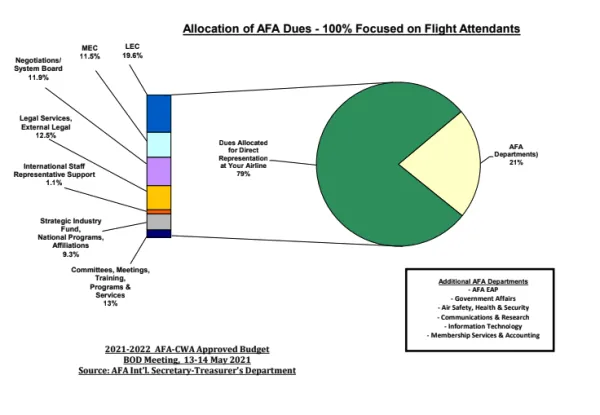BREAKDOWN OF DUES

The Dues Pie Chart – Where do my Dues go?
The Dues Pie Chart depicts where all funds at AFA are budgeted. About 80% of dues dollars are directly allocated to fund the work at each airline, i.e.. Local Councils, Master Executive Councils, Negotiations, and System Board. The remaining budgets at the International Office support Government Affairs, Air Safety, EAP, Information Technology, and Communications Departments, each of which provides expert services that are Flight Attendant focused and provide resources for the local leaders and committees of Flight Attendants at each airline. 100% of our dues dollars are allocated to priorities that provide Flight Attendant representation.
There are four distinct areas where dues money is spent:
1. Local and Airline-specific
Each base has a Local Executive Council (LEC) with elected Officers who provide direct representation and deal with local grievances and other issues. These Local Officers will answer your phone calls and make sure member interests are represented in front of management. For example, in the event of discipline or a contract violation, Local Officers will address the issue where it happened and work to get swift resolution. Additionally, elected Master Executive Council (MEC) Officers provide representation at the corporate level. At both the LEC and MEC, there are committees that solve problems in areas such as safety, schedules, hotels, grievances, etc. These committees also enforce the contract specific to their area of expertise, produce newsletters, and participate in union meetings. The role of your LEC and MEC Officers and committee representatives at each airline is to ensure you are represented by Flight Attendants who know your job because they share it with you at your airline. AFA promotes this autonomy at each airline where your representatives, assisted by experts, negotiate with management, and develop and maintain the relationship between airline management and the Union.
2. Negotiations
Bargaining for pay and working conditions is one of the core representation activities performed by the Union. We start with a membership survey, schedule meetings with management, conduct caucuses with the committee, develop contractual language, support membership engagement and information programs, and we work with AFA-CWA professional negotiators throughout the process including all direct negotiations/mediation with management. The end result is improved contractual language with higher pay, better working conditions, and improved benefits.
3. System Board (Grievances)
The first step in any grievance is to try to resolve the matter locally. Some airlines have negotiated an alternative dispute process for a faster, collaborative resolution. If that fails, then the final stage for resolution, whether disciplinary or contractual, is an appeal to a neutral arbitrator. An AFA-CWA attorney will work with our Grievance Committee to present our case to the neutral arbitrator. We defend the contracts we negotiate.
4. International Office Support
While your LEC is the face of the Union to local management and the MEC to corporate management, the International Office is the public persona and brand of the Union. Our presence and name recognition can legislate or improve federal regulations, remove obstacles from the bargaining table, better our position in negotiations and improve our experience on the job across the profession. The International Office maintains the professional staff of attorneys, negotiators, and other personnel that provide administration, accounting and membership services to members and elected leaders. We all work together to support the programs that encompasses our profession.
